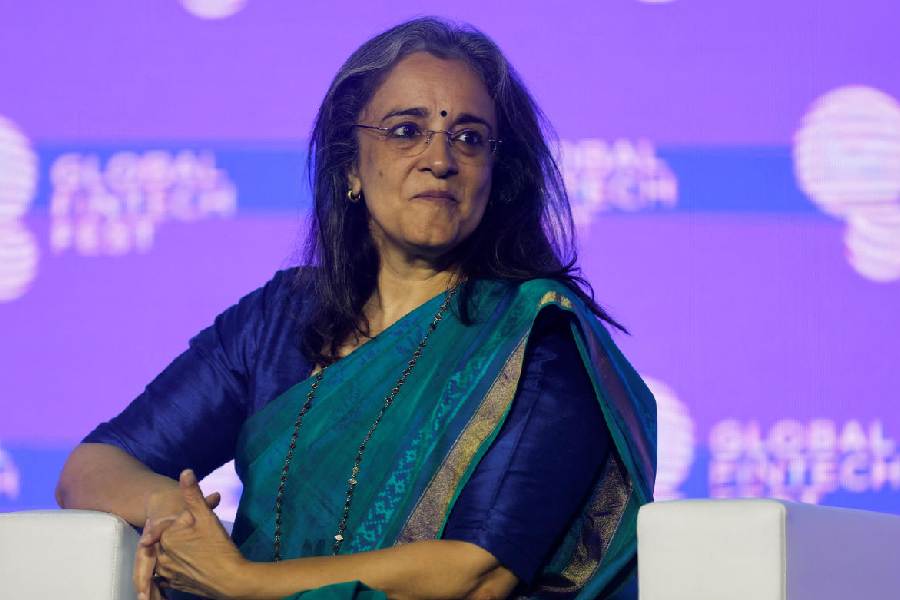Sebi chief Madhabi Puri-Buch skipped a meeting called by Parliament’s public accounts committee on Thursday, sparking a bitter war of words between the BJP and the Congress after panel chairman K.C. Venugopal postponed the meeting to a later date.
Puri-Buch informed Venugopal just two hours before the meeting was to start that she would not be able to attend because of a “personal exigency”.
The PAC was supposed to review Sebi’s performance. But political observers and market mavens had anticipated a tense meeting because the Opposition MPs on the committee were expected to seize the opportunity to grill Puri-Buch on the recent controversies that had engulfed her, compromising her stewardship of the market regulator.
Venugopal told reporters: “The Sebi chairperson had sought an exception from appearing before the committee, which we denied. After that, Puri-Buch confirmed that she and her officials would attend. But at 9.30am, we received a communication from the Sebi chairperson that because of a personal exigency, she would not be able to travel to Delhi.”
Venugopal added: “Considering that this was a request from a woman officer, we thought it would be better to postpone the meeting to another day.”
Sources said that except for Puri-Buch and a senior Sebi executive, a team of officials from the market regulator was present at the venue when Venugopal decided to defer the meeting.
Venugopal’s unilateral decision sparked howls of protest from the BJP, which had been insisting over the past few days that the PAC did not have the remit to grill the Sebi chief.
A senior BJP member accused Venugopal of being politically motivated while insisting on Puri-Buch’s presence and then arbitrarily postponing the session after she failed to turn up.
Puri-Buch has been accused of investing in certain offshore funds based in Mauritius and Bermuda that were also used by the Adani group, which has been under investigation for more than 18 months for allegedly violating Sebi regulations.
The concerns around Puri-Buch’s possible conflict of interest had sparked questions about the probity of the regulator itself.
The wording of the agenda for the PAC meeting was fairly innocuous. It merely termed the meeting a “briefing by Audit followed by Oral evidence of the representatives of Ministry of Finance (Department of Economic Affairs) and SEBI on the subject” and a “Performance Review of Regulatory Bodies established by Act of Parliament”.
Sources clarified that the litany of charges against the Sebi chief was not on the PAC agenda. However, the committee members could ask questions related to these charges. Equally, other members could challenge the line of enquiry if theyfound it objectionable, the sources said.
In August, Hindenburg had alleged that Buch and her husband Dhaval Buch had investments in obscure offshore entities in Bermuda and Mauritius that were used by Vinod Adani, the elder brother of Gautam Adani, to invest in the Indian markets with the aim of pumping up the stock prices of group firms.
The Adani group termed these allegations “malicious, mischievous and manipulative selections of publicly available information to arrive at pre-determined conclusions... with wanton disregard for facts and the law”.
Later, the Congress accused Puri-Buch of continuing to draw income from ICICI Bank even after joining Sebi in March 2017 as a whole-time member. She became its chairperson in March 2022.
PAC role
The primary function of the PAC is to examine the audit report of the Comptroller and Auditor General (C&AG) after it is laid in Parliament. The audit by the C&AG is comprehensive and manifold. It principally involves an accountancy audit, a regulatory audit, an appropriations audit, a discretionary audit, and an efficiency-cum-performance audit.
The PAC acts as a watchdog of the public purse by scrutinising the accounts and examining cases of losses, financial irregularities, and nugatory expenditure.
Every year, at the beginning of its term, the committee selects audit paragraphs in the various reports of the C&AG for in-depth examination and then submits its report to the House after extensive deliberations.
The government is required to inform the committee about the action taken or proposed to be taken on the recommendations that the panel has made. Usually, this must be completed within six months from the presentation of the committee’s report.











